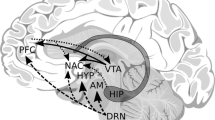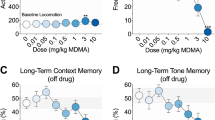Abstract.
Rationale: Psychological dependence to the opioid analgesic morphine is attributable to the rewarding properties of the drug, and its evolution can be divided into two distinct phases: development and maintenance. Both phases can be studied using conditioned place preference (CPP). Objectives: To determine whether the two phases can be influenced by pre-treatment with gabapentin-like compounds. Methods: CPP to morphine was used to demonstrate the rewarding properties of morphine in the presence or absence of gabapentin-like compounds. In-vivo microdialysis in the nucleus accumbens was used to determine the effects of gabapentin or pregabalin on morphine-induced dopamine release. Results: Pretreatment with either gabapentin (10–100 mg/kg p.o.) or pregabalin (3–30 mg/kg p.o.) attenuated CPP induced by a submaximal dose of morphine (0.75 mg/kg). Neither gabapentin nor pregabalin had any effect alone in the CPP test. Both gabapentin-like compounds blocked the effect of morphine (0.75 mg/kg s.c.) to increase the release of dopamine in the nucleus accumbens. Studies of the maintenance of CPP to morphine showed CPP was maintained for at least 4 days after the initial test. In a second experiment, it was found that pregabalin (injected once, 24 h after CPP had been demonstrated) was able to reverse morphine-induced CPP. Conclusions: Neither gabapentin nor pregabalin induced CPP, but both compounds blocked the development of CPP to morphine and also blocked morphine's effects on dopamine release. Furthermore, pregabalin blocked the maintenance of morphine-induced CPP. It is concluded that gabapentin-like compounds, which have no intrinsic rewarding properties, may have some therapeutic use in the treatment of opioid dependence.
Similar content being viewed by others
Author information
Authors and Affiliations
Additional information
Electronic Publication
Rights and permissions
About this article
Cite this article
Andrews, N., Loomis, S., Blake, R. et al. Effect of gabapentin-like compounds on development and maintenance of morphine-induced conditioned place preference. Psychopharmacology 157, 381–387 (2001). https://doi.org/10.1007/s002130100839
Received:
Accepted:
Issue Date:
DOI: https://doi.org/10.1007/s002130100839




